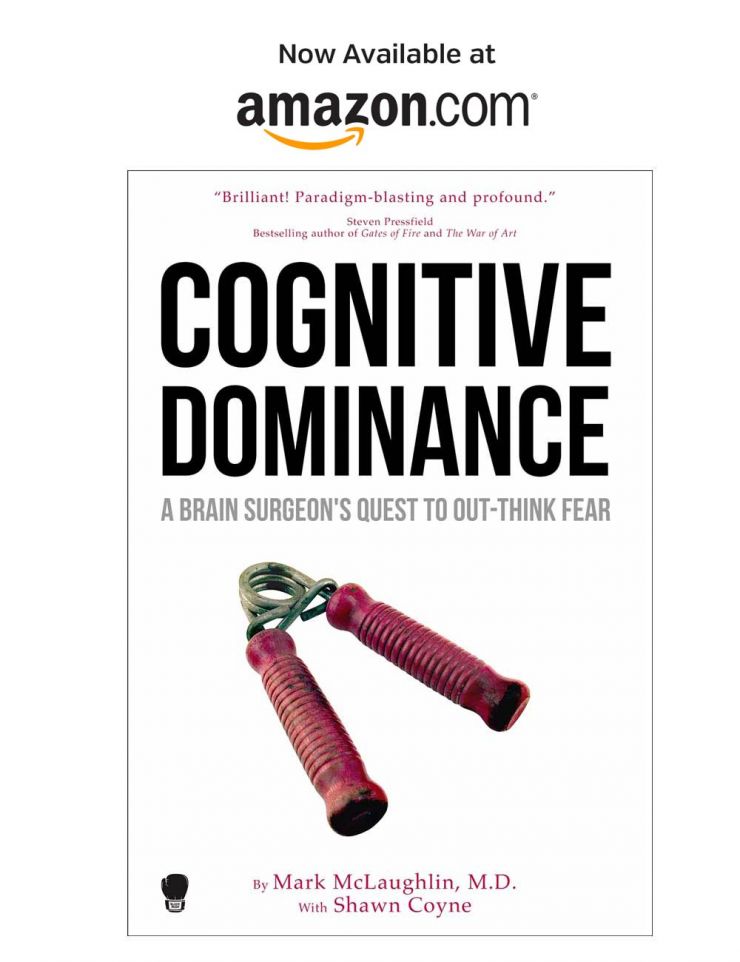Another Day In the Frontal Lobe: Book Review

A fringe benefit of writing a book is that you learn about other books worth reading during your research. I rediscovered such a gem while working on Outthinking Fear (which will be published in October, 2019. Another Day in the Frontal Lobe: A Brain Surgeon Exposes Life on the Inside, by Katrina Firlik, was a rewarding read for a number of reasons. First, it was a great stroll down memory lane, because it’s a memoir by a neurosurgeon that recounts the full trajectory of becoming part of this challenging medical specialty. Second, it was beautifully written and filled with insights of value to anyone, in any walk of life.
Dr. Firlik is a rarity in neurosurgery: a female. Only about 5% of the approximately 3,600 neurosurgeons in the U.S. are women, and less than 250 of them are board-certified. Dr. Firlik was the first woman admitted to the prestigious neurosurgery residency program at the University of Pittsburgh Medical Center. I surely hope this disparity improves over time.
Another Day in the Frontal Lobe takes us back to Firlik’s youth, when she already had many traits that would serve her well in the future. She was very curious, obsessed with facts, and had no problem with messiness and gore. A major influence: her father, a surgeon who often discussed his cases with his fascinated daughter. We follow along eagerly as Firlik decides to become a doctor, then a neurosurgeon, and navigates a path through a world dominated by men.
While still considering neurosurgery, Firlik read a book that helped clinch it for her: The Man Who Mistook His Wife for a Hat by Oliver Sacks. She was fascinated by all the weird cases related to the human brain in that book, and decided to stake her claim to the territory. (To see my opinions about how important reading is for enhancing one’s life and career, read my recent article in Business Insider.]
Firlik wastes no time grabbing our attention. Within the first few pages, she recounts the case of a carpenter who shows up in the ER with a three-inch nail in his forehead that had been accidentally drilled there by his co-worker. As Firlik dryly remarks, “There are no how-to entries in our textbooks regarding removing nails from heads, so we improvised using common sense.”
This episode delivers a valuable lesson for everyone: focus on practical matters, what must be done now, rather than mull over all the knowledge you have (or lack) about the task at hand. Obviously, this is vital in emergency situations. But the rule applies in many arenas. In business, you often must act fast to land a big client over the competition. In sports, you can’t start thinking about the rotation of the ball and the speed of your swing as a fastball rockets toward you. Firlik also points out something I learned long ago: even seemingly complex challenges can be broken down into simple steps. Take care of step one, then move on to step two, then step three. Assess what’s right in front of you. Ask the right questions. And if it doesn’t fit the usual pattern, get off the standard path without delay and improvise.
Throughout, Firlik shares many lessons for living that she has learned as a neurosurgeon. The importance of maintaining a proper balance between being neither too aggressive nor not aggressive enough. The fact that you can’t control everything. And how dealing with life-or-death situations teaches us to have a greater appreciation of everyday life.
Firlik’s admission that she has often experienced fear, uncertainty, or regret during her career was refreshing, considering the big egos that many surgeons have. Why shouldn’t she have these moments? She is still a human being. I have dealt with this range of emotions, too, as has every neurosurgeon (whether they admit it or not).
Speaking of moments of weakness, I was gratified by Firlik’s mention of her terrible sense of direction…because I have the same problem! That may strike fear in a patient whose surgeon is about to navigate around his brain while he lies unconscious; there’s no Google maps or Siri for brain surgery! Fear not; the interior of the brain is not a series of streets and intersections. Its distinct terrain is imprinted on my own brain, as I’m sure it is on Firlik’s.
There are many memorable quotes in Another Day in the Frontal Lobe. Here are some of my favorites:
- “Neurosurgery requires a delicate balance between fearlessness and caution.”
- “The patient is the one taking the risk, not surgeon.”
- “Anything strong enough to help you is strong enough to hurt you.”
- “The truth is we are trained to do a job. Recognize a problem, come up with the solution, and execute that plan.”
- And here’s how one of her mentors responds to patients who wonder why they developed a terrible condition: “There are three possibilities: bad genes, bad habits, or bad luck.”
Firlik covers the entire territory of being a neurosurgeon, the highest of highs and lowest of lows. The need for a surgeon to be a ray of hope, as well as the relater of harsh truth. Dealing with surgeons with big egos. Recognizing when a seemingly straightforward condition like an earache may indicate a potentially fatal brain infection. That listening is as important as talking.
How does she manage to have an enjoyable evening after a devastating day? “Because, in thinking like a neurosurgeon, you also have to know how to make a decision in the face of tragedy and then just move on.”
My Rating

I didn’t mention that I had the privilege of training with Dr. Firlik at the University of Pittsburgh. To learn more about women in neurosurgery stay tuned for my next blog about a pioneer Dr. Dorothy Klenke Nash.
Pardon the Interruption!
I would appreciate it, if you would sign up now to subscribe to my monthly Newsletter. Stay up-to-date as I discuss medicine, wrestling, personal growth, cognitive dominance, and other issues which intrigue me.
Warm Regards
Mark
